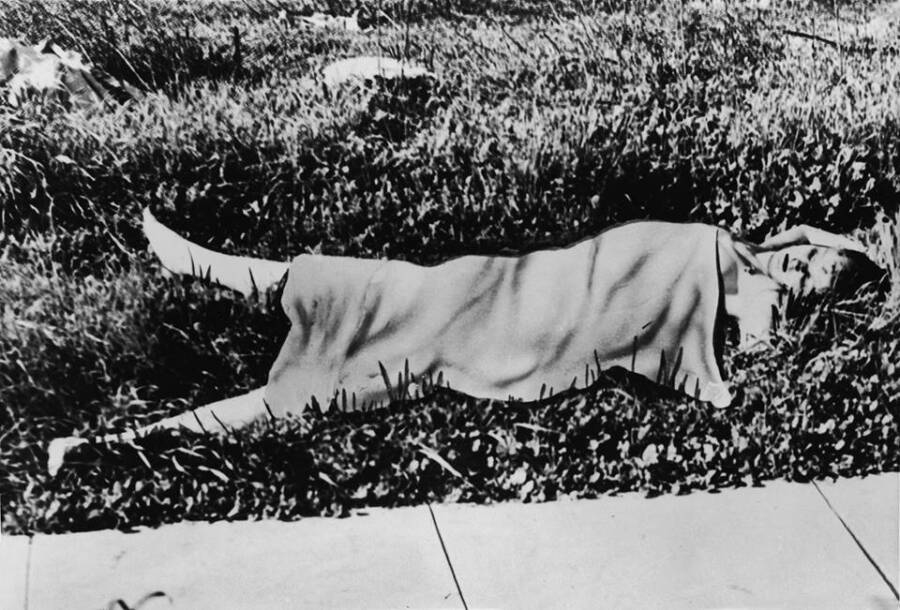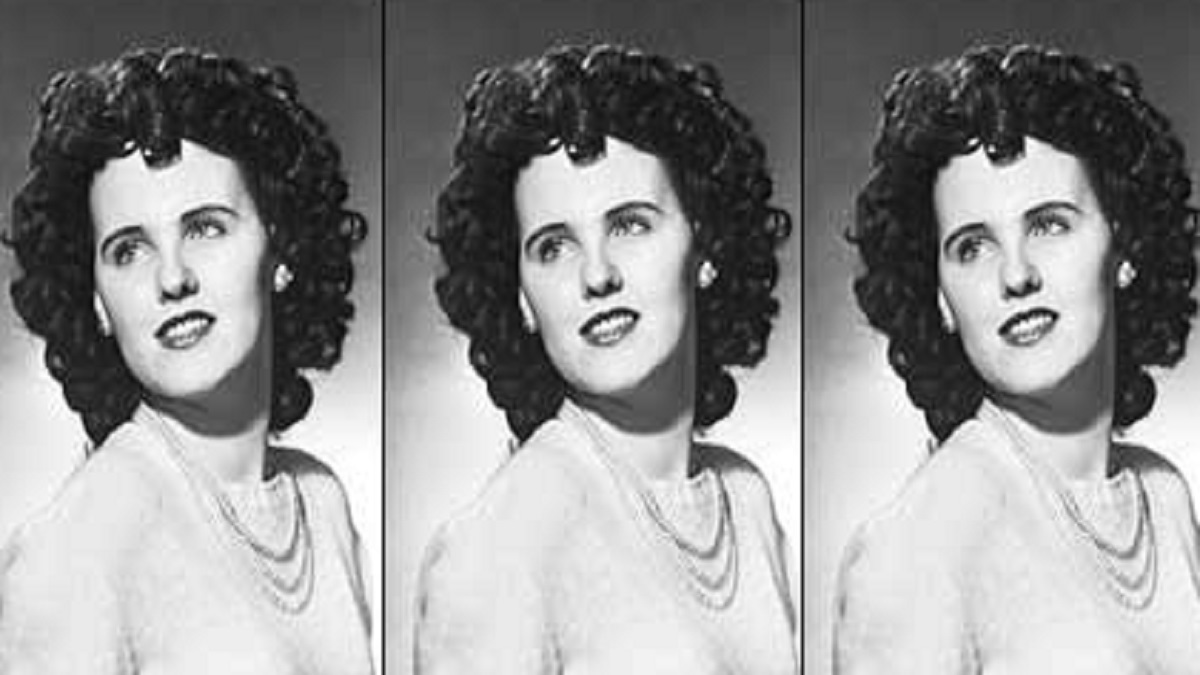Unveiling The Tragic Story Of Elizabeth Short's Dead Body: The Mystery That Still Haunts
When you hear the name Elizabeth Short, it’s impossible not to feel a chill run down your spine. Her story has been etched into history as one of the most haunting and mysterious cases of all time. The discovery of Elizabeth Short's dead body in 1947 sent shockwaves through Los Angeles and beyond, sparking a media frenzy that continues to captivate people to this day. But who was Elizabeth Short? And why does her tragic story still linger in our collective consciousness?
Elizabeth Short, often referred to as "The Black Dahlia," wasn’t just another victim of a brutal crime. Her case became a symbol of the darkness lurking beneath the glitz and glamour of Hollywood. From the moment her body was found in a vacant lot, the world was hooked on unraveling the mystery behind her death. But despite countless theories and investigations, the truth remains elusive, leaving us with more questions than answers.
As we dive deeper into the chilling tale of Elizabeth Short's dead body, we’ll explore the circumstances surrounding her murder, the impact it had on society, and the enduring fascination with her story. This isn’t just about a crime; it’s about the human desire to understand the inexplicable and the lengths we’ll go to uncover the truth. So, buckle up, because this is one ride you won’t forget!
Read also:Unveiling The Enigma A Deep Dive Into Kenedi Anderson
Table of Contents
- Elizabeth Short: A Brief Biography
- The Discovery of Elizabeth Short's Dead Body
- The Investigation: What Really Happened?
- Unraveling the Theories: Who Killed Elizabeth Short?
- The Media Sensation: How the Press Covered the Case
- The Lasting Legacy of Elizabeth Short
- The Psychological Impact on Society
- Elizabeth Short and Hollywood's Dark Side
- Modern-Day Relevance: Why We Still Talk About Her
- Conclusion: The Mystery Lives On
Elizabeth Short: A Brief Biography
Who Was Elizabeth Short?
Before we dive into the gory details of her death, let’s take a moment to understand who Elizabeth Short was as a person. Born on July 29, 1924, in Boston, Massachusetts, Elizabeth was the third of five daughters in her family. Her childhood was marked by frequent moves and a tumultuous relationship with her father, who abandoned the family when Elizabeth was just a teenager.
Despite her challenges, Elizabeth was known for her striking beauty and charismatic personality. She moved to Florida during World War II, where she worked as a clerk in an airbase. Her dream was to make it big in Hollywood, and by 1946, she had made her way to Los Angeles, hoping to break into the film industry. Little did she know that her dreams would be cut tragically short.
| Full Name | Elizabeth Short |
|---|---|
| Nickname | The Black Dahlia |
| Birthdate | July 29, 1924 |
| Birthplace | Boston, Massachusetts |
| Cause of Death | Murder |
The Discovery of Elizabeth Short's Dead Body
On January 15, 1947, a shocking discovery was made in a vacant lot on South Norton Avenue in Los Angeles. It was there that Elizabeth Short's dead body was found, her body grotesquely mutilated and divided at the waist. The scene was so horrific that it left investigators and the public alike stunned. Her face was split into a macabre grin, a result of slashes to her mouth that extended to her ears.
What made the discovery even more chilling was the apparent care taken by the killer to pose her body in a specific way. Elizabeth’s body was arranged in a semi-prone position, with her hands placed above her head. The killer had even washed the body and removed any traces of blood, suggesting a level of meticulousness that sent shivers down the spines of those involved in the investigation.
The Investigation: What Really Happened?
Law enforcement immediately launched a massive investigation into Elizabeth Short's murder. Detectives scoured the area for clues, interviewed countless witnesses, and followed up on leads from all over the country. But despite their best efforts, the case quickly turned into one of the most baffling unsolved murders in American history.
Several suspects were identified over the years, but none were ever conclusively linked to the crime. The lack of physical evidence and the killer's apparent expertise in disposing of the body made it nearly impossible to pinpoint the perpetrator. The investigation remains open to this day, a testament to the enduring mystery surrounding Elizabeth Short's death.
Read also:Lena Polanski A Rising Star In The Spotlight
Key Details of the Investigation
- No fingerprints were found on the body.
- The killer had knowledge of human anatomy, suggesting a possible medical or forensic background.
- Multiple confessions were received, but none were credible.
- Elizabeth's last known movements were traced to a coffee shop in Los Angeles, where she was seen hours before her disappearance.
Unraveling the Theories: Who Killed Elizabeth Short?
Over the decades, numerous theories have emerged about who might have been responsible for Elizabeth Short's murder. Some point to a jilted lover, while others suggest a serial killer with a penchant for targeting young women. One theory even posits that the killer was someone from Elizabeth’s past, seeking revenge for perceived slights.
One of the most intriguing theories involves a man named Walter Bayley, a former physician with a history of violence. Bayley reportedly had a fixation on Elizabeth and was known to have been in Los Angeles around the time of her death. While circumstantial, this theory has gained traction among those who believe the killer had a medical background.
Other theories suggest that Elizabeth’s death was part of a larger conspiracy involving Hollywood elites or organized crime. Despite the lack of concrete evidence, these theories continue to fuel speculation and debate among true crime enthusiasts.
The Media Sensation: How the Press Covered the Case
The media played a significant role in shaping public perception of Elizabeth Short's case. Newspapers across the country splashed her story on their front pages, dubbing her "The Black Dahlia" in reference to a 1946 film noir movie titled "The Blue Dahlia." The nickname stuck, and it became synonymous with the mystery surrounding her death.
Journalists flocked to Los Angeles, eager to uncover the truth behind the gruesome murder. Their coverage was often sensationalized, with lurid details and speculative theories that captivated readers. The intense media attention helped keep Elizabeth’s story alive, even as other cases faded into obscurity.
The Lasting Legacy of Elizabeth Short
Decades after her death, Elizabeth Short continues to be a subject of fascination for writers, filmmakers, and true crime enthusiasts. Her story has inspired books, movies, and documentaries, each offering a new perspective on the events that led to her tragic demise.
But beyond the pop culture references, Elizabeth’s legacy lies in the way her case highlights the dark underbelly of society. It serves as a reminder of the dangers faced by vulnerable individuals and the importance of seeking justice for those who cannot speak for themselves.
The Psychological Impact on Society
The murder of Elizabeth Short had a profound psychological impact on society, particularly in Los Angeles. It shattered the illusion of safety in a city that prided itself on its glitz and glamour. People began to question the security of their neighborhoods and the trustworthiness of those around them.
For many, Elizabeth’s story became a cautionary tale about the dangers of pursuing dreams in unfamiliar environments. It also sparked conversations about the treatment of women in society and the need for greater awareness of violence against women.
Elizabeth Short and Hollywood's Dark Side
Elizabeth Short’s connection to Hollywood adds another layer of intrigue to her story. While she never achieved her dream of becoming a movie star, her presence in the city of angels made her a symbol of the allure and danger of the entertainment industry. Her case exposed the seedy side of Hollywood, where dreams often collide with harsh realities.
Many have speculated that Elizabeth’s murder was tied to the dark secrets of the film industry, where power dynamics and corruption often go unchecked. Whether or not this is true, her story serves as a reminder of the complexities and contradictions of life in Tinseltown.
Modern-Day Relevance: Why We Still Talk About Her
In today’s world, where true crime stories dominate the cultural landscape, Elizabeth Short’s case remains as relevant as ever. Her story resonates with audiences who are drawn to the mystery and tragedy of her life and death. It also speaks to the universal desire to seek justice and closure for unsolved crimes.
As technology advances and new investigative techniques emerge, there’s hope that one day the truth behind Elizabeth Short's murder will finally come to light. Until then, her story will continue to captivate and haunt us, a testament to the enduring power of mystery and the human need for answers.
Conclusion: The Mystery Lives On
In conclusion, the story of Elizabeth Short's dead body is one that continues to captivate and confound. From her humble beginnings in Boston to her tragic end in Los Angeles, her life and death have left an indelible mark on society. While the truth may never be fully known, her legacy lives on through the countless stories and theories that have emerged over the years.
We invite you to share your thoughts and theories in the comments below. Do you believe you know who killed Elizabeth Short? Or do you think the truth will forever remain a mystery? Whatever your take, one thing is certain: Elizabeth Short’s story will continue to haunt and inspire for generations to come.
And hey, if you enjoyed this deep dive into the world of true crime, be sure to check out our other articles on unsolved mysteries and historical events. There’s always more to discover, and we’d love to have you along for the ride!


